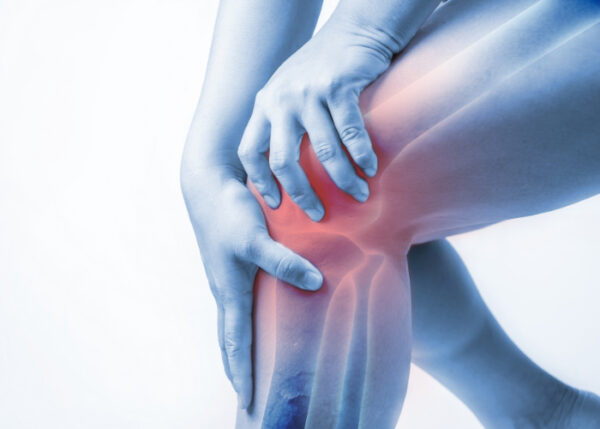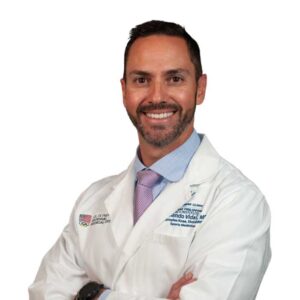What is Patellofemoral Chondral Pain?
Patellofemoral pain refers to the area where the patella (kneecap) meets the femur (long bone in the thigh). The term chondral refers to a special type of cartilage in the knee known as the articular cartilage. You’ve seen this substance on the ends of chicken bones – it is white and slippery and allows the knee bones to glide smoothly against each other. If there is a defect in this articular cartilage, rather it be a tear, divot or any other type of injury, patellofemoral chondral pain is the result. Dr. Armando Vidal, orthopedic knee specialist has extensive experience in treating patellofemoral chondral pain and can help patients in Vail, Aspen and the surrounding Denver Colorado communities who are experiencing knee pain.

Why do I have dull, aching pain in the front of my knee?
Interestingly, articular cartilage does not have a nerve supply, so it does not cause pain when there is a mild or early injury. It also cannot repair itself if damaged. It is not uncommon for chondral damage to be asymptomatic for years before knee pain is experienced. Often, a sudden injury will cause symptoms of pain and catching in the knee. After years of wear-and-tear of the articular cartilage, arthritis and osteoarthritis may result, causing a myriad of symptoms for the patient.
Why would articular cartilage become damaged?
Cartilage can be injured in a variety of different ways. In the patellofemoral joint the most common mechanisms are traumatic (usually with a patella dislocation) or wear and tear (usually from malalignment).
The severity of a chondral injury is graded according to the following scale:
- Grade 1 – Early damage. Usually just softening of the articular cartilage.
- Grade 2 – The cartilage looks frayed and shows superficial damage (<50% thickness)
- Grade 3 – An area of damage greater than 1.5 cm and/or greater than 50% thickness. Patients often complain of a grinding or popping noise in their knee. They also may have a hard time standing from a squatting position or ascending or descending stairs.
- Grade 4 – Full thickness cartilage loss. This level of damage shows subchondral bone. The area is large, and pain is more severe. Patients experience limited activity and range of motion. Oftentimes the subchondral bone is also injured or diseased.
What are the symptoms of a patellofemoral chondral injury?
Patients in the Denver Colorado metroplex often do not experience symptoms right away. Once they appear patients report the following:
- Intermittent swelling in the knee
- Pain when going up and down stairs or walking for long periods of time
- Knee instability, or the knee buckling when putting weight on the joint
- Locking or catching in the knee
- Grinding or popping of the knee when moved
How is a patellofemoral chondral injury treated?
The goal for treating a patellofemoral chondral injury is to get the patient out of pain and back to their normal activities. If the grade of injury is minimal, Dr. Vidal may suggest physical therapy to strengthen the muscles around the joint. Weight loss may be suggested, if necessary and medications can be prescribed to lessen the painful symptoms of patellofemoral pain. Dr. Vidal may inject hyaluronic acid into the knee to reduce friction and improve lubrication of the joint.
Platelet Rich Plasma (PRP) – This new and innovative non-surgical treatment has shown great promise in the treatment of articular cartilage damage. PRP is a high concentration of endogenous blood platelets, known for their ability to help blood clot. The variety of proteins, called growth factors that platelet rich plasma contains, speed up the healing process following and injury. Dr. Vidal is a thought leader at The Steadman Clinic on the use of PRP and other biologic treatments.
Surgical Treatments:
When non-surgical treatments have failed to alleviate knee pain, Dr. Vidal may perform one of the more specialized treatments for a patellofemoral injury. These may include:
Chondroplasty (Shaving or Debridement) – Despite its simplicity, this remains one of the first line treatments for patellofemoral chondral damage. This is an arthroscopic procedure where the rough and unstable edges are smoothed out to help improve the mechanical symptoms and swelling that accompanies these injuries. For some patients, this is the definitive and final procedure. For others, this step serves as the first step in a more complicated cartilage repair treatment strategy.
MACI – Matrix-Induced Autologous Chondrocyte Implantation. MACI remains one of the most successful cartilage repair strategies for chondral injuries in the patella and/or trochlea. This procedure utilizes a patient’s own cartilage cells to reconstruct a defect. This is a two-stage surgery where cartilage cells from your knee are harvested and sent to a lab in Boston. There they are cultured and expanded and then embedded on a collagen scaffold that is used to repair a cartilage defect. These cells are usually harvested during the chondroplasty and can be stored for up to five years for later implantation. This technique is very versatile – especially for the unique architecture of the patella and trochlea.
Osteochondral Allograft (OCA) – Often considered the “Cadillac” of cartilage repair, OCA is a procedure where a living, viable cartilage graft is taken from a donor and used to repair a focal cartilage defect. This technique is also very versatile and has a long, proven track record.
Dr. Vidal – an expert in cartilage repair for patients in Vail, Denver and Aspen can help you determine what repair strategy is most appropriate for your chondral lesion.
Cartilage Reconstruction Surgeon
Have you experienced a recent trauma to the knee, including dislocation? If so, you may be at an increased risk of experiencing a patellofemoral chondral injury or tear. These injuries can result in long-term knee instability, buckling, or weakness. Cartilage repair surgeon, Doctor Armando Vidal can help create a specialized treatment plan for patients in Vail, Aspen, and the surrounding Denver, Colorado communities who are experiencing knee instability due to damage of the cartilage. Contact Dr. Vidal’s team today!

Locations
180 S Frontage Rd W
Vail, CO 81657
226 Lusher Court
Ste 101
Frisco, CO 80443
322 Beard Creek Road
Edwards, CO 81632


